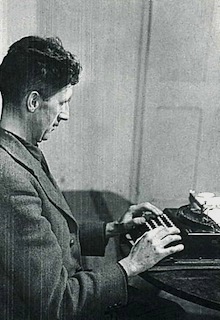Sometimes my tireless staff of thousands looks back and sees a blogpost that demands to be reposted. This one from Dec. 17, 2004 — 18 years ago next week, imagine that:

When 1984 came around smack in the middle of the rose-tinted Reagan era, many in the commentariat had a field day noting that George Orwell, for all his genius, had overstated his case. The future he’d warned of in 1984 simply hadn’t come to pass.
Yeah, right. Thinking of Bill Moyers this morning, it occurred to me that the subversive heresies of Big Brother’s chief enemy, Emmanuel Goldstein, are worth quoting. They come from Goldstein’s historical treatise, “The Theory and Practice of Oligarchical Collectivism,” which is embedded in Orwell’s novel and is smuggled to its doomed hero Winston Smith, who reads it avidly. Goldstein’s first chapter begins:
Throughout recorded time, and probably since the end of the Neolithic Age, there have been three kinds of people in the world, the High, the Middle, and the Low. They have been subdivided in many ways, they have borne countless different names, and their relative numbers, as well as their attitude toward one another, have varied from age to age, but the essential structure of society has never altered. Even after enormous upheavals and seemingly irrevocable changes, the same pattern has always reasserted itself, just as a gyroscope will always return to equilibrium, however far it is pushed one way or the other.
By the fourth decade of the twentieth century all the
main currents of political thought were authoritarian.
Goldstein goes on to point out that the “aims of these three groups are entirely irreconcilable”:
The aim of the High is to remain where they are. The aim of the Middle is to change places with the High. The aim of the Low, when they have an aim — for it is an abiding characteristic of the Low that they are too much crushed by drudgery to be more than intermittently conscious of anything outside their daily lives — is to abolish all distinctions and create a society in which all men shall be equal.
Orwell’s pessimism, expressed through Goldstein, is inescapable. It is Goldstein who writes that “no advance in wealth, no softening of manners, no reform or revolution has ever brought human equality a millimeter nearer.” But there can be no question that it is Orwell who’s speaking.
And here we come to a passage in Goldstein’s treatise that might as well have been addressed to those of us who’ve lived long past 1984 into the 21st century:
The heirs of the French, English, and American revolutions had partly believed in their own phrases about the rights of man, freedom of speech, equality before the law, and the like, and had even allowed their conduct to be influenced by them to some extent. But by the fourth decade of the twentieth century all the main currents of political thought were authoritarian. The earthly paradise had been discredited at exactly the moment when it became realizable. Every new political theory, by whatever name it called itself, led back to hierarchy and regimentation. And in the general hardening of outlook that set in round about 1930, practices which had been long abandoned, in some cases for hundreds of years — imprisonment without trial, the use of war prisoners as slaves, public executions, torture to extract confessions, the use of hostages and the deportation of whole populations — not only became common again, but were tolerated and even defended by people who considered themselves enlightened liberals.
OK, so Goldstein doesn’t actually exist. He’s a fiction created by the oligarchy (the High caste of the Inner Party that rules in the name of Big Brother). He’s an enemy of the people, a strawman to divert attention from the failures of the oligarchy, a way to focus patriotic hatred, just as Big Brother himself is a fiction created by the oligarchy to instill fear.
These many years later in the midst of the neocon era — when the twin engines of misrule are also hatred and fear — I’d say Orwell’s portrait of the future rings even truer than it did 20 years ago.
(Now . . . hmmm . . . 38 years ago.)

Orwell wasn’t wrong, just pessimistic, in believing that the authoritarian surveillance state would arrive by 1984 instead of not until the second decade of the 21st century.
Yes, seems to me he was too accurate for comfort. the stuff he saw is very scary. One thing I still haven’t completely understood is, what sort of metagame was he playing by naming the strawman Emmanuel Goldstein? Was it a metagame or something much more obvious?
Emmanuel Goldstein…Emmanuel, the Christ. Goldstein, the Jew. Christ the Jew.